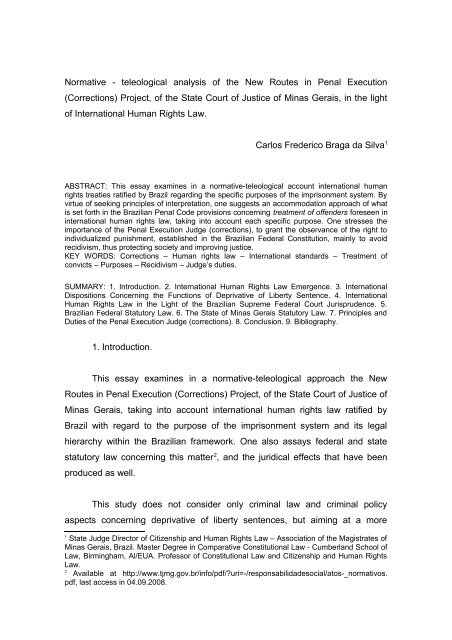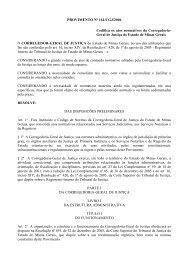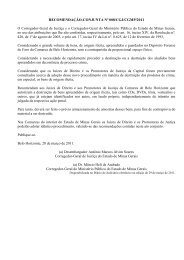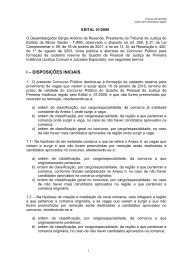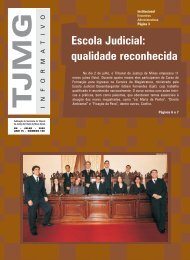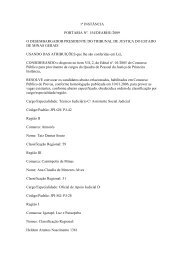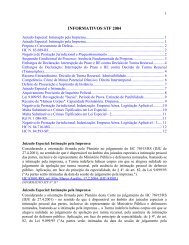Normative - teleological analysis of the Project âNovos Rumos na ...
Normative - teleological analysis of the Project âNovos Rumos na ...
Normative - teleological analysis of the Project âNovos Rumos na ...
You also want an ePaper? Increase the reach of your titles
YUMPU automatically turns print PDFs into web optimized ePapers that Google loves.
<strong>Normative</strong> - <strong>teleological</strong> <strong>a<strong>na</strong>lysis</strong> <strong>of</strong> <strong>the</strong> New Routes in Pe<strong>na</strong>l Execution(Corrections) <strong>Project</strong>, <strong>of</strong> <strong>the</strong> State Court <strong>of</strong> Justice <strong>of</strong> Mi<strong>na</strong>s Gerais, in <strong>the</strong> light<strong>of</strong> Inter<strong>na</strong>tio<strong>na</strong>l Human Rights Law.Carlos Frederico Braga da Silva 1ABSTRACT: This essay examines in a normative-<strong>teleological</strong> account inter<strong>na</strong>tio<strong>na</strong>l humanrights treaties ratified by Brazil regarding <strong>the</strong> specific purposes <strong>of</strong> <strong>the</strong> imprisonment system. Byvirtue <strong>of</strong> seeking principles <strong>of</strong> interpretation, one suggests an accommodation approach <strong>of</strong> whatis set forth in <strong>the</strong> Brazilian Pe<strong>na</strong>l Code provisions concerning treatment <strong>of</strong> <strong>of</strong>fenders foreseen ininter<strong>na</strong>tio<strong>na</strong>l human rights law, taking into account each specific purpose. One stresses <strong>the</strong>importance <strong>of</strong> <strong>the</strong> Pe<strong>na</strong>l Execution Judge (corrections), to grant <strong>the</strong> observance <strong>of</strong> <strong>the</strong> right toindividualized punishment, established in <strong>the</strong> Brazilian Federal Constitution, mainly to avoidrecidivism, thus protecting society and improving justice.KEY WORDS: Corrections – Human rights law – Inter<strong>na</strong>tio<strong>na</strong>l standards – Treatment <strong>of</strong>convicts – Purposes – Recidivism – Judge’s duties.SUMMARY: 1. Introduction. 2. Inter<strong>na</strong>tio<strong>na</strong>l Human Rights Law Emergence. 3. Inter<strong>na</strong>tio<strong>na</strong>lDispositions Concerning <strong>the</strong> Functions <strong>of</strong> Deprivative <strong>of</strong> Liberty Sentence. 4. Inter<strong>na</strong>tio<strong>na</strong>lHuman Rights Law in <strong>the</strong> Light <strong>of</strong> <strong>the</strong> Brazilian Supreme Federal Court Jurisprudence. 5.Brazilian Federal Statutory Law. 6. The State <strong>of</strong> Mi<strong>na</strong>s Gerais Statutory Law. 7. Principles andDuties <strong>of</strong> <strong>the</strong> Pe<strong>na</strong>l Execution Judge (corrections). 8. Conclusion. 9. Bibliography.1. Introduction.This essay examines in a normative-<strong>teleological</strong> approach <strong>the</strong> NewRoutes in Pe<strong>na</strong>l Execution (Corrections) <strong>Project</strong>, <strong>of</strong> <strong>the</strong> State Court <strong>of</strong> Justice <strong>of</strong>Mi<strong>na</strong>s Gerais, taking into account inter<strong>na</strong>tio<strong>na</strong>l human rights law ratified byBrazil with regard to <strong>the</strong> purpose <strong>of</strong> <strong>the</strong> imprisonment system and its legalhierarchy within <strong>the</strong> Brazilian framework. One also assays federal and statestatutory law concerning this matter 2 , and <strong>the</strong> juridical effects that have beenproduced as well.This study does not consider only crimi<strong>na</strong>l law and crimi<strong>na</strong>l policyaspects concerning deprivative <strong>of</strong> liberty sentences, but aiming at a more1State Judge Director <strong>of</strong> Citizenship and Human Rights Law – Association <strong>of</strong> <strong>the</strong> Magistrates <strong>of</strong>Mi<strong>na</strong>s Gerais, Brazil. Master Degree in Comparative Constitutio<strong>na</strong>l Law - Cumberland School <strong>of</strong>Law, Birmingham, Al/EUA. Pr<strong>of</strong>essor <strong>of</strong> Constitutio<strong>na</strong>l Law and Citizenship and Human RightsLaw.2Available at http://www.tjmg.gov.br/info/pdf/?uri=-/responsabilidadesocial/atos-_normativos.pdf, last access in 04.09.2008.
humanistic account it focuses fur<strong>the</strong>r on constitutio<strong>na</strong>l law doctrine andpersuasive precedents to highlight <strong>the</strong> logical meaning <strong>of</strong> enforcing inter<strong>na</strong>tio<strong>na</strong>llaw norms within domestic Courts.The fi<strong>na</strong>l proposal will be a ratio<strong>na</strong>l interpretation which couldaccommodate <strong>the</strong> application <strong>of</strong> deprivation <strong>of</strong> liberty in accordance with <strong>the</strong>principle <strong>of</strong> human dignity. Such approach will probably fulfill <strong>the</strong> normativepurpose <strong>of</strong> reform and social rehabilitation <strong>of</strong> convicts foreseen in inter<strong>na</strong>tio<strong>na</strong>ltreaties. The approval <strong>of</strong> <strong>the</strong> outcome suggested will depend on accepting <strong>the</strong>values enshrined in constitutio<strong>na</strong>l law as superior ones.2. Inter<strong>na</strong>tio<strong>na</strong>l Human Rights Law Emergence.The Universal Declaration <strong>of</strong> Human Rights 3 was drafted shortly after <strong>the</strong>end <strong>of</strong> <strong>the</strong> atrocities verified in <strong>the</strong> Second World War. The UDHR - <strong>the</strong> mosttranslated juridical document in all times - has been considered by many peoplea remarkable product <strong>of</strong> juridical reasoning. Its first article assimilates relevantinfluence <strong>of</strong> philosophy, <strong>na</strong>tural law and universalism when asserting that “Allhuman beings are born free and equal in dignity and rights”. Hence, bydeclaring that rights came as result <strong>of</strong> being human, <strong>the</strong> UDHR rejected <strong>the</strong>traditio<strong>na</strong>l view that rights can only be conferred by governments 4 , disclosingthat “<strong>the</strong> right to have rights” is a historic achievement <strong>of</strong> mankind 5 .Never<strong>the</strong>less, mainly due to <strong>the</strong> Cold War and to <strong>the</strong> political conditionsthat prevailed right after World War II ended, time in which <strong>the</strong> division betweencommunists and capitalists contributed to accentuate hidden and avowedpolitical divergences, only in 1966 were <strong>the</strong> Inter<strong>na</strong>tio<strong>na</strong>l Cove<strong>na</strong>nt on3Universal Declaration <strong>of</strong> Human Rights, G. A. Res. 217A, available athttp://daccessdds.un.org/doc/RESOLUTION/GEN/NR0/043/88/IMG/NR004388.pdf?OpenElement (Dec. 10, 1948) [herei<strong>na</strong>fter UDHR].4Paul Gordon Lauren, The Evolution <strong>of</strong> Inter<strong>na</strong>tio<strong>na</strong>l Human Rights: Visions Seen 213-227(University <strong>of</strong> Pennsylvania Press, 2d ed. 2003).5Han<strong>na</strong>h Arendt quoted in Flávia Piovesan, Direitos Humanos e o Direito Constitucio<strong>na</strong>lInter<strong>na</strong>cio<strong>na</strong>l, [Human Rights and Inter<strong>na</strong>tio<strong>na</strong>l Constitutio<strong>na</strong>l Law] 118 (Editora Saraiva, SãoPaulo/SP, 8th ed. 2007).
Economic, Social and Cultural Rights 6 and <strong>the</strong> Inter<strong>na</strong>tio<strong>na</strong>l Cove<strong>na</strong>nt on Civiland Political Rights issued 7 . Both <strong>of</strong> <strong>the</strong>m compound “The Inter<strong>na</strong>tio<strong>na</strong>l Bill <strong>of</strong>Human Rights”, according to <strong>the</strong> United Nations terminology 8 , and triggered <strong>the</strong>inter<strong>na</strong>tio<strong>na</strong>l legal system <strong>of</strong> protecting <strong>the</strong>se rights 9 .3. Inter<strong>na</strong>tio<strong>na</strong>l Dispositions Concerning <strong>the</strong> Functions <strong>of</strong> Deprivative <strong>of</strong>Liberty Sentence.The Inter<strong>na</strong>tio<strong>na</strong>l Cove<strong>na</strong>nt on Civil and Political Rights 10 provides that allpersons deprived <strong>of</strong> <strong>the</strong>ir liberty shall be treated with humanity and with respectfor <strong>the</strong> inherent dignity <strong>of</strong> <strong>the</strong> human person, as well as that <strong>the</strong> penitentiarysystem shall comprise treatment <strong>of</strong> prisoners <strong>the</strong> essential aim <strong>of</strong> which shall be<strong>the</strong>ir reformation and social rehabilitation 11 . Hence, it establishes <strong>the</strong> way inwhich corrections must run, and also determines its chief goal.The United Nations adopted standard minimum rules for <strong>the</strong> treatment <strong>of</strong>prisoners 12 , and it provides that <strong>the</strong> purpose and justification <strong>of</strong> a sentence <strong>of</strong>imprisonment or a similar measure deprivative <strong>of</strong> liberty is ultimately to protectsociety against crime. This end can only be achieved if <strong>the</strong> period <strong>of</strong>imprisonment is used to ensure, so far as possible, that upon his return tosociety <strong>the</strong> <strong>of</strong>fender is not only willing but able to lead a law-abiding and selfsupportinglife 13 . To this end, <strong>the</strong> institution should utilize all <strong>the</strong> remedial,educatio<strong>na</strong>l, moral, spiritual and o<strong>the</strong>r forces and forms <strong>of</strong> assistance which are6Inter<strong>na</strong>tio<strong>na</strong>l Cove<strong>na</strong>nt on Economic, Social and Cultural Rights, G. A. Res. 2200A (XXI),available athttp://daccessdds.un.org/doc/RESOLUTION/GEN/NR0/005/03/IMG/NR000503-.pdf?OpenElement (Dec. 16 1966) [herei<strong>na</strong>fter ICESCR].7Inter<strong>na</strong>tio<strong>na</strong>l Cove<strong>na</strong>nt on Civil and Political Rights, G. A. Res. 2200A (XXI), available athttp://daccessdds.un.org/doc/RESOLUTION/GEN/NR0/005/03/IMG/NR000503.pdf?OpenElement (Dec. 16, 1966) [herei<strong>na</strong>fter ICCPR].8Available at http://www2.ohchr.org/english/law/, último acesso em 08.09.2008.9Flávia Piovesan, op. cit., p. 158.10Art. 10, 1.11Id., 3.12Adopted by <strong>the</strong> First United Nations Congress on <strong>the</strong> Prevention <strong>of</strong> Crime and <strong>the</strong> Treatment<strong>of</strong> Offenders, held at Geneva in 1955, and approved by <strong>the</strong> Economic and Social Council by itsresolutions 663 C (XXIV) <strong>of</strong> 31 July 1957 and 2076 (LXII) <strong>of</strong> 13 May 1977. Available at.http://www2.ohchr.org/english/law/treatmentprisoners.htm, last access in 26.01.2009.13Principle 58.
appropriate and available, and should seek to apply <strong>the</strong>m according to <strong>the</strong>individual treatment needs <strong>of</strong> <strong>the</strong> prisoners 14 .Fur<strong>the</strong>rmore, <strong>the</strong> American Convention on Human Rights establishesthat punishments consisting <strong>of</strong> deprivation <strong>of</strong> liberty shall have as an essentialaim <strong>the</strong> reform and social readaptation <strong>of</strong> <strong>the</strong> prisoners 15 . The mandatoryconclusion is that <strong>the</strong> imprisonment system should at least furnish prisoners <strong>the</strong>conditions required by law, mainly considering that <strong>the</strong> first contact <strong>of</strong> mostconvicts with a system which intends to fit <strong>the</strong>ir values and perso<strong>na</strong>lities to a lifein society is within <strong>the</strong> penitentiary system.It should be noted that <strong>the</strong> central purpose <strong>of</strong> inter<strong>na</strong>tio<strong>na</strong>l human rightslaw is to call into question positive legal practices that fail to respect universalvalues 16 . Interpreting is, undoubtedly, hierarchizing 17 ; and in fact law can not bedefined o<strong>the</strong>r than by <strong>the</strong> difference it makes in society 18 . Hence, in aDurkheimian perspective, after signing inter<strong>na</strong>tio<strong>na</strong>l human rights law treaties<strong>the</strong> Federative Republic <strong>of</strong> Brazil makes itself into optimistic societies – thosethat choose rehabilitation over deterrence, incapacitation, and/or retribution – ;and those societies do so because <strong>the</strong>y view <strong>the</strong> crimi<strong>na</strong>l as a malleable,redeemable, and reclaimable human who can be reabsorbed into societybecause <strong>the</strong> cause <strong>of</strong> his crime is not inherent in his essence but is a result <strong>of</strong>disease or social causes. Moreover, optimistic societies choose rehabilitation14Principle 59. One should stress <strong>the</strong> principle 61, which provides that <strong>the</strong> treatment <strong>of</strong> prisonersshould emphasize not <strong>the</strong>ir exclusion from <strong>the</strong> community, but <strong>the</strong>ir continuing part in it.Community agencies should, <strong>the</strong>refore, be enlisted wherever possible to assist <strong>the</strong> staff <strong>of</strong> <strong>the</strong>institution in <strong>the</strong> task <strong>of</strong> social rehabilitation <strong>of</strong> <strong>the</strong> prisoners. There should be in connection wi<strong>the</strong>very institution social workers charged with <strong>the</strong> duty <strong>of</strong> maintaining and improving all desirablerelations <strong>of</strong> a prisoner with his family and with valuable social agencies. Steps should be takento safeguard, to <strong>the</strong> maximum extent compatible with <strong>the</strong> law and <strong>the</strong> sentence, <strong>the</strong> rightsrelating to civil interests, social security rights and o<strong>the</strong>r social benefits <strong>of</strong> prisoners.15Art. 5º, 6, available at http://www.oas.org/juridico/english/treaties/b-32.html, last access in26.01.2009 [herei<strong>na</strong>fter ACHR].16Gerald L. Neuman, The Uses <strong>of</strong> Inter<strong>na</strong>tio<strong>na</strong>l Law in Constitutio<strong>na</strong>l Interpretation, 98 A.J.I.L.82, 85 (2004).17Luís Carlos Balbino Gambogi, Direito: Razão e Sensibilidade, As Intuições <strong>na</strong> HermenêuticaJurídica [Law: Reason and Sensibility, Intuitions in <strong>the</strong> Juridical Hermeneutic] 14 (Editora DelRey, Belo Horizonte/MG, 2006).18David M. Trubek, Where <strong>the</strong> Action Is: Critical Legal Studies and Empiricism, 36 Stan. L.Rev. 575, (1984).
ecause <strong>the</strong>y believe <strong>the</strong>y have <strong>the</strong> means to effect rehabilitation within <strong>the</strong>seindividuals 19 . Fi<strong>na</strong>lly, <strong>the</strong>y have enough confidence in <strong>the</strong> collective moral valuesembodied in <strong>the</strong>ir framework, through which <strong>the</strong>y intend to transform mostcrimi<strong>na</strong>ls into good citizens.4. Inter<strong>na</strong>tio<strong>na</strong>l Human Rights Law in <strong>the</strong> Light <strong>of</strong> <strong>the</strong> Brazilian SupremeFederal Court Jurisprudence.Indeed, a special place for <strong>the</strong> values addressed in inter<strong>na</strong>tio<strong>na</strong>l humanrights law has been duly perceived in <strong>the</strong> Brazilian constitutio<strong>na</strong>l system. Thus,in Brazil inter<strong>na</strong>tio<strong>na</strong>l treaties depend upon conjugated wills <strong>of</strong> Executive andLegislative Branches 20 , and are entirely entrusted to <strong>the</strong> Government <strong>of</strong> <strong>the</strong>Federative Republic <strong>of</strong> Brazil, which is formed by <strong>the</strong> indissoluble union <strong>of</strong> <strong>the</strong>States, Municipalities and <strong>the</strong> Federal District 21 . Under <strong>the</strong> Brazilian Constitution<strong>the</strong> Union shall have <strong>the</strong> power to maintain relations with foreign States andparticipate in inter<strong>na</strong>tio<strong>na</strong>l organizations 22 . The Constitution also provides asduties <strong>of</strong> <strong>the</strong> President <strong>of</strong> <strong>the</strong> Republic to maintain relations with foreign States 23and conclude inter<strong>na</strong>tio<strong>na</strong>l treaties, conventions and acts, ad referendum <strong>of</strong> <strong>the</strong>Natio<strong>na</strong>l Congress 24 .By u<strong>na</strong>nimity, <strong>the</strong> Full Court <strong>of</strong> <strong>the</strong> Brazilian Federal Supreme Courtdecided that, when signing an inter<strong>na</strong>tio<strong>na</strong>l treaty, <strong>the</strong> President <strong>of</strong> Brazilrepresents not only <strong>the</strong> Federal Government, but also <strong>the</strong> Brazilian State as a19Ashley T. Aubuchon. 2008. "Rehabilitating Durkheim: Social Solidarity and Rehabilitation inEastern State Penitentiary, 1829-1850" Available at: http://works.bepress.com/ashley-_aubuchon/10, last access in 17.05.2009.20S.T.F., ADIN n.° 1.480-3, Distrito Federal, Rappourter: Min. Celso de Mello, 04.09.1997, findat http://www.stf.gov.br: “The exam <strong>of</strong> <strong>the</strong> current Federal Constitution allows concluding that<strong>the</strong> execution <strong>of</strong> inter<strong>na</strong>tio<strong>na</strong>l treaties, and <strong>the</strong>refore <strong>the</strong>ir incorporation to <strong>the</strong> inter<strong>na</strong>l order, in<strong>the</strong> system adopted for Brazil, are derived <strong>of</strong> a subjectively complex act, resultant <strong>of</strong> twoconjugated and homogeneous wills: <strong>of</strong> <strong>the</strong> Natio<strong>na</strong>l Congress, which decides, definitively, bymeans <strong>of</strong> legislative decree, on treaties, inter<strong>na</strong>tio<strong>na</strong>l agreements or acts (CF, art. 49, I) and <strong>of</strong><strong>the</strong> President <strong>of</strong> <strong>the</strong> Republic, that, beyond being able to celebrate <strong>the</strong>se acts <strong>of</strong> inter<strong>na</strong>tio<strong>na</strong>llaw (CF, art. 84, VIII), also make use - while Head <strong>of</strong> State that is - <strong>of</strong> <strong>the</strong> ability to promulgate<strong>the</strong>m by means <strong>of</strong> decree.”21C.F. art. 1º.22C.F., art. 21, I.23C.F., art. 84, VII.24C.F. art. 84, VIII.
whole; hence, he does not act as a single Chief <strong>of</strong> Government, but as Head <strong>of</strong>State. So, inter<strong>na</strong>tio<strong>na</strong>l law treaties are made under <strong>the</strong> authority <strong>of</strong> <strong>the</strong> FederalRepublic <strong>of</strong> Brazil, which has competence and constitutio<strong>na</strong>l legitimacy tocelebrate inter<strong>na</strong>tio<strong>na</strong>l treaties binding on <strong>the</strong> State <strong>of</strong> Brazil and to disclose to<strong>the</strong> inter<strong>na</strong>tio<strong>na</strong>l community <strong>the</strong> sovereign will <strong>of</strong> <strong>the</strong> Nation. 25The Brazilian Supreme Federal Court decided in <strong>the</strong> RHC n° 79.785 26that “[A]s well as it does not affirm it in regard to inter<strong>na</strong>l federal statutes, <strong>the</strong>Constitution did not need to say itself overlapping inter<strong>na</strong>tio<strong>na</strong>l treaties: <strong>the</strong>hierarchy is inherent in unequivocal rules, as <strong>the</strong> ones that submit inter<strong>na</strong>tio<strong>na</strong>lconventions approving and promulgating to <strong>the</strong> legislative procedure imposedby <strong>the</strong> Constitution and less demanding than constitutio<strong>na</strong>l amendment processand that one that, in consequence, explicitly states that inter<strong>na</strong>tio<strong>na</strong>l treatiesshould be object <strong>of</strong> judicial review”. 27On December, third, 2008, <strong>the</strong> Brazilian Supreme Federal Courta<strong>na</strong>lyzed whe<strong>the</strong>r an inter<strong>na</strong>l federal statute issued in 1969, within <strong>the</strong> lastmilitary dictatorial period, was in conformity not only with <strong>the</strong> currentConstitution, but also with <strong>the</strong> inter<strong>na</strong>tio<strong>na</strong>l human rights treaties subscripted by<strong>the</strong> Federative Republic <strong>of</strong> Brazil. And within <strong>the</strong> challenged federal statute<strong>the</strong>re was a provision that allowed <strong>the</strong> civil arrest <strong>of</strong> a person who did not pay abank debt, a kind <strong>of</strong> install payments, which has been currently celebratedmainly to fi<strong>na</strong>nce automobiles acquisition. The Brazilian Supreme Federal Courtaffirmed <strong>the</strong> federal statute inconsistent with both <strong>the</strong> ICCPR and <strong>the</strong> ACHR,which expressly stated that no one shall be detained for debt. Thus, it is fair tosay that within <strong>the</strong> Brazilian legal system inter<strong>na</strong>tio<strong>na</strong>l human rights treaties areconsidered supralegal, <strong>the</strong>refore, superior to inter<strong>na</strong>l federal statutesinconsistent with <strong>the</strong>m, but do not have constitutio<strong>na</strong>l status.25S.T.F., RE n° 229.096-0, Rappourter: Min. Cármen Lúcia, 16.08.2007, find athttp://www.stf.gov.br.26S.T.F., RHC n° 79.785, Rio de Janeiro, Rappourter: Min. Sepúlveda Pertence, 29.03.2000,finde at http://stf.gov.br.27C.F., art. 102, III(b)
Similarly, it is well known that <strong>the</strong> Brazilian constitutio<strong>na</strong>l law doctrine hasreceived influence <strong>of</strong> <strong>the</strong> American Supreme Court jurisprudence. In Marbury v.Madison <strong>the</strong> Supreme Court affirmed that “it can not be presumed that anyclause in <strong>the</strong> constitution is intended to be without effect; and <strong>the</strong>refore such aconstruction is i<strong>na</strong>dmissible, unless <strong>the</strong> words require it” 28 .According to Brazilian Justice Celso de Mello one can not even censureeventual practices <strong>of</strong> judicial activism exerted by <strong>the</strong> Brazilian Supreme Court,especially because, among <strong>the</strong> innumerable causes that justify this affirmativebehavior <strong>of</strong> <strong>the</strong> Judiciary Power, which creates a positive jurisprudence, <strong>the</strong>re isa necessity <strong>of</strong> prioritizing <strong>the</strong> Constitution <strong>of</strong> <strong>the</strong> Republic, which has been manytimes transgressed and disrespected by pure, simple and convenient omission<strong>of</strong> <strong>the</strong> State Branches. Actually, when <strong>the</strong> Brazilian Supreme Court supplies <strong>the</strong>unconstitutio<strong>na</strong>l omissions, it has restored <strong>the</strong> Constitution, which had beenviolated due to <strong>the</strong> inertia <strong>of</strong> <strong>the</strong> State; and in so doing <strong>the</strong> Court has donenothing more than fulfilling its constitutio<strong>na</strong>l mission 29 .Moreover, among <strong>the</strong> indispensable measures to ensure <strong>the</strong> foundations<strong>of</strong> existence, one should include as mandatory duties <strong>of</strong> <strong>the</strong> State <strong>the</strong>reintegration <strong>of</strong> socially margi<strong>na</strong>lized groups, for example, drug addicts,alcoholics and delinquents 30 . Therefore, <strong>the</strong> government omission is notacceptable. Even though on exceptio<strong>na</strong>l basis, whereas an omission <strong>of</strong> <strong>the</strong>o<strong>the</strong>r branches is harmful, it is within <strong>the</strong> duties <strong>of</strong> <strong>the</strong> Judiciary Power todetermine <strong>the</strong> implementation <strong>of</strong> mandatory public politics defined by <strong>the</strong>Constitution, and to grant effectiveness and integrity to social and cultural rightsimpreg<strong>na</strong>ted <strong>of</strong> constitutio<strong>na</strong>l stature 31 .28Marbury v. Madison, 5 U.S. 137, 161 (1803).29Celso de Mello, Justice <strong>of</strong> <strong>the</strong> Brazilian Supreme Federal Court, speech delivered when chiefJustice Gilmar Mendes was conducted to <strong>the</strong> current Presidency <strong>of</strong> <strong>the</strong> Brazilian SupremeFederal Court, available at http://www.stf.gov.br/arquivo/cms/noticiaNoticiaStf/anexo/-discursoCMposseGM.--pdf, last visited in 08.28.2008.30Kildare Gonçalves de Carvalho. Direito Constitucio<strong>na</strong>l, Teoria do Estado e da Constituição,Direito Constitucio<strong>na</strong>l Positivo [Constitutio<strong>na</strong>l Law, Theory <strong>of</strong> State and Constitution, PositiveConstitutio<strong>na</strong>l Law] 158 (Belo Horizonte: Del Rey, 14ª ed., 2008).31S.T.F., RE-AgR 410715, São Paulo, Rappourter: Min. Celso de Mello, 22/11/2005, find at.www.stf.gov.br.
5. Brazilian Federal Statutory Law.The Brazilian Pe<strong>na</strong>l Code provides that, when delivering a deprivative <strong>of</strong>liberty sentence, <strong>the</strong> Judge should consider <strong>the</strong> judicial circumstances andestablish <strong>the</strong> sanction to be applied, its amount and <strong>the</strong> initial form <strong>of</strong>compliance, as necessary and sufficient for crime disapproval and prevention 32 .Moreover, <strong>the</strong> Pe<strong>na</strong>l Execution Law determines that corrections aim putting intoeffect <strong>the</strong> provisions <strong>of</strong> crimi<strong>na</strong>l sentence or decision, and at providingconditions for <strong>the</strong> harmonic social integration <strong>of</strong> <strong>the</strong> convicts 33 .By virtue <strong>of</strong> seeking principles <strong>of</strong> interpretation, one suggests a<strong>na</strong>ccommodation approach <strong>of</strong> what is set forth in <strong>the</strong> Brazilian Pe<strong>na</strong>l Codeprovisions concerning treatment <strong>of</strong> <strong>of</strong>fenders established in inter<strong>na</strong>tio<strong>na</strong>l norms,taking into account each specific purpose. The interpreting rule addressed inMurray v. The Schooner Charming Betsy should be a guideline: “[t]he statutese<strong>na</strong>cted by Congress ought to never be construed to violate <strong>the</strong> law <strong>of</strong> <strong>na</strong>tions ifo<strong>the</strong>r possible construction remains”. 34This study proposes using <strong>the</strong> values addressed within inter<strong>na</strong>tio<strong>na</strong>lsources to inform domestic decisions. One should stress that inter<strong>na</strong>tio<strong>na</strong>lhuman rights law does not intend to substitute <strong>na</strong>tio<strong>na</strong>l legal systems, but <strong>the</strong>former can supplement <strong>the</strong> latter, in order to improve <strong>the</strong> possible legal redress,just in case possible omissions and particular deficiencies occur 35 .Hence, in accordance with <strong>the</strong> Brazilian Pe<strong>na</strong>l Code, first and foremost<strong>the</strong> crimi<strong>na</strong>l Judges must set <strong>the</strong> sanction to disapprove and prevent crime, thusalso attending society’s interest. The limit <strong>of</strong> punishment judicially fixed on eachsentence avoids hateful discretion and eter<strong>na</strong>l punishment by <strong>the</strong> State, thus32Brazilian Pe<strong>na</strong>l Code, Article 59.33Brazilian Federal Law nº. 7.210, 11.07.1984, Article 1º.34Murray v. The Schooner Charming Betsy, 6 U.S. 64 (1804). See also ICCPR, Article 5, 2, aswell as ACHR, Article. 29.35Flávia Piovesan, Direitos Humanos e o Direito Constitucio<strong>na</strong>l Inter<strong>na</strong>cio<strong>na</strong>l, [Human Rightsand Inter<strong>na</strong>tio<strong>na</strong>l Constitutio<strong>na</strong>l Law] 159 (Editora Saraiva, São Paulo/SP, 8th ed. 2007)
publicly revealing to each convict and to <strong>the</strong> whole society as well <strong>the</strong> quantity<strong>of</strong> pe<strong>na</strong>lty imposed on. In a second moment, grounded on <strong>the</strong> principle <strong>of</strong>human dignity, <strong>the</strong>refore, <strong>the</strong> interests <strong>of</strong> <strong>the</strong> convict in aggregating values and<strong>of</strong> <strong>the</strong> community in preventing recidivism, corrections can not deviate from itsprimary purpose, which consists <strong>of</strong> a treatment <strong>of</strong> reforming and socialreadaptation <strong>of</strong> <strong>the</strong> prisoners.One should stress that <strong>the</strong> word treatment has been traditio<strong>na</strong>llyconnected to security measures instead <strong>of</strong> deprivative <strong>of</strong> liberty sentences.Hence, an initial resistance to domestically accept <strong>the</strong> meaning foreseen ininter<strong>na</strong>tio<strong>na</strong>l norms is admissible. However, this study considers that <strong>the</strong>fi<strong>na</strong>listic interpretation is <strong>the</strong> best one, and understands <strong>the</strong> word treatment notonly as a simple medical solution, but also as a complex penitentiaryintervention whereby <strong>the</strong> socialization <strong>of</strong> prison inmates could be achieved. Tobe successful, such restorative action has to have multidiscipli<strong>na</strong>ry <strong>na</strong>ture andenough effectiveness to prevent recidivism, and should be compulsory provide<strong>the</strong> convicts within <strong>the</strong> imprisonment sentence experience. Indeed, <strong>the</strong>circumstances <strong>of</strong> each case, added to <strong>the</strong> prisoner’s indispensable consensusand collaboration, which must be perso<strong>na</strong>lly verified by <strong>the</strong> correctio<strong>na</strong>l judge 36 ,will rule its development and influence <strong>the</strong> outcome reached, thus concretizing<strong>the</strong> constitutio<strong>na</strong>l right <strong>of</strong> individualized punishment 37 in pe<strong>na</strong>l execution as well.6. The State <strong>of</strong> Mi<strong>na</strong>s Gerais Statutory Law.36Joint Decree nº. 862/07, 23.05.2005, which provides rules for removing prisoners subjected todeprivation <strong>of</strong> liberty sentence for <strong>the</strong> social reintegration centers - SRS ma<strong>na</strong>ged byassociations <strong>of</strong> protection and assistance to convicts – APACS, edited by <strong>the</strong> President <strong>of</strong> <strong>the</strong>Court <strong>of</strong> Justice <strong>of</strong> <strong>the</strong> State <strong>of</strong> Mi<strong>na</strong>s Gerais and <strong>the</strong> Corregidor-General <strong>of</strong> Justice: “Art. 2º: Theprisoner convicted to a deprivation <strong>of</strong> liberty sentence, under closed, half-open and openregimes, whatever <strong>the</strong> length <strong>of</strong> rebuke and crime committed, may be removed to <strong>the</strong> SRSma<strong>na</strong>ged by APACS, through motivated act <strong>of</strong> <strong>the</strong> correctio<strong>na</strong>l judge, after hearing <strong>the</strong> publicprosecutor and <strong>the</strong> penitentiary administration, and met <strong>the</strong> following conditions: I - express, in awritten form, interest in being removed and complying with SRS rules.”37C. F., art. 5º, XLVI.
The State <strong>of</strong> Mi<strong>na</strong>s Gerais Statutory Law provides as a duty <strong>of</strong> <strong>the</strong> Stateto grant convicts <strong>the</strong> necessary conditions to <strong>the</strong>ir rehabilitation to live insociety, thus hiring qualified pr<strong>of</strong>essio<strong>na</strong>ls to achieve this objective 38 .The Judiciary Power, like <strong>the</strong> o<strong>the</strong>r ones, has to obey its own hierarchy.The State Court <strong>of</strong> Justice <strong>of</strong> Mi<strong>na</strong>s Gerais, among its attributions andconcretizing 39 <strong>the</strong> provisions already mentioned in this essay, as well as takinginto account that deprivative <strong>of</strong> liberty punishment has as an essential aim <strong>the</strong>rehabilitation <strong>of</strong> convict, and also that <strong>the</strong> 4 th article <strong>of</strong> Pe<strong>na</strong>l Execution Lawprescribes that <strong>the</strong> State must 40 obtain <strong>the</strong> community’s support concerning<strong>of</strong>ficial correctio<strong>na</strong>l activities, created <strong>the</strong> "New Paths in Pe<strong>na</strong>l Execution(Corrections) <strong>Project</strong>". Such project aims at giving incentive <strong>the</strong> foundation <strong>of</strong>Associations <strong>of</strong> Protection and Assistance to Convicts – APAC, institutioncapable <strong>of</strong> <strong>of</strong>fering a human improvement method to better <strong>the</strong> convict’sconditions <strong>of</strong> rehabilitation, thus protecting society and increasing justice.7. Principles and Duties <strong>of</strong> <strong>the</strong> Pe<strong>na</strong>l Execution Judge (corrections).When <strong>the</strong> Judge supplies some omissions concerning fundamental rightshe does it in a supplementary way, thus acting provisory and secondarily due tolegislative i<strong>na</strong>ction 41 . With regard to inter<strong>na</strong>tio<strong>na</strong>l human rights law enforcement,lack <strong>of</strong> judicial activism actually means judicial omission, which could contributeto a crisis <strong>of</strong> legitimacy 42 : <strong>the</strong> intention <strong>of</strong> <strong>the</strong> Constitution’s authors can nei<strong>the</strong>rbe ignored nor disobeyed without producing negative consequences.Justice Celso de Mello has already asserted that <strong>the</strong> Judiciary Powerconstitutes <strong>the</strong> instrument which grants civil freedoms, constitutio<strong>na</strong>l guarantees38State Law nº. 12.936, 08/07/1998, section 2.39Resolution nº. 433/04, 28/04/2004, e<strong>na</strong>cted by <strong>the</strong> Superior Court <strong>of</strong> <strong>the</strong> State Court <strong>of</strong> Justice<strong>of</strong> Mi<strong>na</strong>s Gerais.40Judge Paulo Antônio de Carvalho, from Itaú<strong>na</strong> County, always stresses <strong>the</strong> verb use in animperative way: “must”.41Dirley Cunha Júnior, Controle Judicial das Omissões do Poder Público [Judicial Review <strong>of</strong>Public Power Omissions] 334 (São Paulo: Saraiva, 2004).42Id, p. 349.
and <strong>the</strong> basic rights assured by treaties and inter<strong>na</strong>tio<strong>na</strong>l conventionssubscripted by Brazil. This high mission - which was trusted to <strong>the</strong> judges andCourts - is characterized as one <strong>of</strong> <strong>the</strong> most expressive political functions <strong>of</strong> <strong>the</strong>Brazilian Judiciary Power. He also affirmed that <strong>the</strong> Judge, in <strong>the</strong> BrazilianInstitutio<strong>na</strong>l Organization, represents <strong>the</strong> state agency in charge <strong>of</strong> materializing<strong>the</strong> public freedoms proclaimed by <strong>the</strong> constitutio<strong>na</strong>l declaration <strong>of</strong> rights andacknowledge by <strong>the</strong> acts and inter<strong>na</strong>tio<strong>na</strong>l conventions based on <strong>the</strong> law <strong>of</strong> <strong>the</strong>Nations.According to Justice Celso de Mello, <strong>the</strong> Judge has <strong>the</strong> duty to act as ansupporter <strong>of</strong> <strong>the</strong> Constitution - and to guarantee its supremacy - in <strong>the</strong>unconditio<strong>na</strong>l defense <strong>of</strong> <strong>the</strong> basic freedoms <strong>of</strong> <strong>the</strong> human being, ensuring, still,effectiveness to <strong>the</strong> rights established in inter<strong>na</strong>tio<strong>na</strong>l treaties <strong>of</strong> which Brazil ispart. Justice Celso de Mello affirmed that this is <strong>the</strong> most important socialmission and, at <strong>the</strong> same time, politically more sensible, that has been imposedto Judges, in general, and to <strong>the</strong> Brazilian Supreme Court, in particular. Hestated that notably <strong>the</strong> judges and Courts have <strong>the</strong> duty to respect and topromote <strong>the</strong> effectiveness <strong>of</strong> <strong>the</strong> rights guaranteed by <strong>the</strong> Constitutions andassured by inter<strong>na</strong>tio<strong>na</strong>l declarations, in order to allow <strong>the</strong> practice <strong>of</strong> ademocratic constitutio<strong>na</strong>lism opened to <strong>the</strong> process <strong>of</strong> increasing <strong>the</strong>inter<strong>na</strong>tio<strong>na</strong>lization <strong>of</strong> <strong>the</strong> human being’s basic rights 43 .The United Nations Office on Drugs and Crime (Unodc) published <strong>the</strong>Bangalore Draft Code <strong>of</strong> Judicial Conduct 2001, adopted by <strong>the</strong> Judicial Groupon Streng<strong>the</strong>ning Judicial Integrity, as revised at <strong>the</strong> Round Table Meeting <strong>of</strong>Chief Justices held at <strong>the</strong> Peace Palace, The Hague, November 25-26, 2002 44 .According to its drafting history “[T]he objective <strong>of</strong> <strong>the</strong> meeting was to address<strong>the</strong> problem that was created by evidence that, in many countries, across all <strong>the</strong>continents, many people were losing confidence in <strong>the</strong>ir judicial systemsbecause <strong>the</strong>y were perceived to be corrupt or o<strong>the</strong>rwise partial.” In its preamble43S.T.F, Habeas Corpus 87.585/TO - Tocantins, Rappourter: Min. Marco Aurélio, 12.03.2008,find at http://www.stf.gov.br/44Available at http://www.unodc.org/pdf/corruption/bangalore_e.pdf, last access in 17.05.2009.
was also asserted that “public confidence in <strong>the</strong> judicial system and in <strong>the</strong> moralauthority and integrity <strong>of</strong> <strong>the</strong> judiciary is <strong>of</strong> <strong>the</strong> utmost importance in a moderndemocratic society” 45 .Principle 6 should be highlighted. It provides that competence anddiligence are prerequisites to <strong>the</strong> due performance <strong>of</strong> judicial <strong>of</strong>fice. So shouldprinciple 6.4, which states that a Judge shall keep himself or herself informedabout relevant developments <strong>of</strong> inter<strong>na</strong>tio<strong>na</strong>l law, including inter<strong>na</strong>tio<strong>na</strong>lconventions and o<strong>the</strong>r instruments establishing human rights norms.Likewise, <strong>the</strong> Natio<strong>na</strong>l Council <strong>of</strong> Justice urges all Brazilian Judges tocomply <strong>the</strong> Natio<strong>na</strong>l Code <strong>of</strong> Magistrates 46 , which establishes that knowledgeand training <strong>of</strong> Judges are intensively special with regard to matters, techniquesand attitudes towards maximum protection <strong>of</strong> human rights and development <strong>of</strong>constitutio<strong>na</strong>l values.Fur<strong>the</strong>rmore, nowadays <strong>the</strong>re has undoubtedly been reciprocal influenceamong countless legal cultures, and such has been fostered on <strong>the</strong> ground <strong>of</strong>globalization development. Similarly, <strong>the</strong> advent <strong>of</strong> <strong>the</strong> inter<strong>na</strong>tio<strong>na</strong>l humanrights system has changed <strong>the</strong> conditions <strong>of</strong> constitutio<strong>na</strong>l adjudication in manycountries and <strong>the</strong> coexistence <strong>of</strong> inter<strong>na</strong>tio<strong>na</strong>l and domestic positive legalsystems for <strong>the</strong> articulation and protection <strong>of</strong> <strong>the</strong> fundamental rights <strong>of</strong>individuals may result in cooperation or conflict. But, inevitably, <strong>the</strong>y will affecteach o<strong>the</strong>r. 47 Thus, <strong>the</strong> creation <strong>of</strong> authoritative inter<strong>na</strong>tio<strong>na</strong>l human rightsnorms has had an impact on <strong>the</strong> fate <strong>of</strong> human rights. Its role, however, isultimately subsidiary. The fate <strong>of</strong> human rights – <strong>the</strong>ir implementation,abridgment, protection, violation, enforcement, denial, or enjoyment – is largely45Available at http://www.unodc.org/documents/corruption/publications_unodc_commentarye.pdf,last access in 17.05.2008.46Approved in <strong>the</strong> 68ª Natio<strong>na</strong>l Council <strong>of</strong> Justice Ordi<strong>na</strong>ry Session, in 06.08.2008, file nº200820000007337; published 18.09.2008; available at http://www.cnj.jus.br/index.php?view-=article&catid=170%3Ageral&id=4980%3Acodigo-de-etica-da-magistratura&format=pdf&option-=com_content&Itemid=491, art. 32, last access in 17.05.2009.47Gerald L. Neuman, The Uses <strong>of</strong> Inter<strong>na</strong>tio<strong>na</strong>l Law in Constitutio<strong>na</strong>l Interpretation, 98 A.J.I.L.82, 85 (2004).
a matter <strong>of</strong> <strong>na</strong>tio<strong>na</strong>l, not inter<strong>na</strong>tio<strong>na</strong>l, action. This implies a fur<strong>the</strong>r particularityin <strong>the</strong> way inter<strong>na</strong>tio<strong>na</strong>l norms are put into practice. 48 In addition, <strong>the</strong>inter<strong>na</strong>tio<strong>na</strong>l legal system lacks not only a legislature but also a developed courtsystem, and it has only weak enforcement powers. 49 As a result, this studysustains that inter<strong>na</strong>tio<strong>na</strong>l law language and standard-setting evolution shouldalso penetrate into substantive domestic law through <strong>the</strong> Courts decisionmakingprocess and administrative decisions. Therefore, mainly in mattersconcerning inter<strong>na</strong>tio<strong>na</strong>l human rights law, one can not disregard howconstitutio<strong>na</strong>lly significant this law is throughout <strong>the</strong> world.The constitutio<strong>na</strong>lization <strong>of</strong> <strong>the</strong> Law, instead <strong>of</strong> ba<strong>na</strong>lizing even <strong>the</strong> mostserious Constitution’s intentions or migrating diverse ordi<strong>na</strong>ry rules into that,means <strong>the</strong> penetration <strong>of</strong> <strong>the</strong> Constitution to give form and life to inferior federalstatutes. A hermetic Constitutio<strong>na</strong>l text can not be conceived, but its associationto a constitutio<strong>na</strong>l block, which addresses sparse norms, embedded <strong>of</strong>fundamental values 50 .Hence, <strong>the</strong> Pe<strong>na</strong>l Execution State Judge must apply which is establishedin <strong>the</strong> United Nations human rights law treaties ratified by Brazil, as well as ino<strong>the</strong>r inter<strong>na</strong>tio<strong>na</strong>l norms, mentioned in this essay. One can not disregard <strong>the</strong>popular support to <strong>the</strong> lex talionis (an eye for an eye, a tooth for a tooth), or inopposition to punishment established by law, submitted to a system <strong>of</strong> justiceconsidered, most <strong>of</strong> <strong>the</strong> times, to be slow, bureaucratic and ineffective. Illegalpunishment has been seen as a practical solution or at least as a resource tosupport <strong>the</strong> fight against crime 51 . None<strong>the</strong>less, Judges must keep <strong>the</strong>mselvesfar from this demagogic point <strong>of</strong> view and remember <strong>the</strong>ir mandatory impartial48Jack Donnely, Universal Human Rights in Theory & Practice ,173 (Cornell University Press,2d ed. 2003).49Di<strong>na</strong>h Shelton, Inter<strong>na</strong>tio<strong>na</strong>l human rights law: Principled, Double, or Absent Standards?, 25Law & Ineq. J. 467, 469 (2007).50José Tarcízio de Almeida Melo. Direito Constitucio<strong>na</strong>l do Brasil [Constitutio<strong>na</strong>l Law fromBrazil] 41(Belo Horizonte, Del Rey, 2008).51Alberto Carlos Almeida & Clifford Young, A Cabeça do Brasileiro, [The Brazilian’s Mind] 132(Editora Record, Rio de Janeiro/São Paulo, 2d ed. 2007).
condition, thus avoiding <strong>the</strong> conviction <strong>of</strong> <strong>the</strong> Federative Republic <strong>of</strong> Brazil forstate omission, for example, before <strong>the</strong> Inter-American Court <strong>of</strong> Human Rights 52 .8. Conclusion.Actually, one does not have to interpret fundamental rights, but enforcing<strong>the</strong>m. Savigny’s classic hermeneutic method barely deciphers <strong>the</strong> fundamentalrights real meaning, because that should be ordi<strong>na</strong>rily used in interpretingprivate law 53 .The improvement <strong>of</strong> Rule <strong>of</strong> Law in Brazil requires rescuing <strong>the</strong> JudiciaryPower credibility and transforming streets into safe places. And when <strong>the</strong>Judiciary Power engages with <strong>the</strong> inter<strong>na</strong>tio<strong>na</strong>l human rights law with regard to<strong>the</strong> imprisonment system, it sets an ongoing example <strong>of</strong> rehabilitating andsends to <strong>the</strong> whole Brazilian society a valuable moral message: one needs tosupport <strong>the</strong> values universally accepted to achieve success against violenceand to increase <strong>the</strong> Law as an effective form <strong>of</strong> preventive social control.Hence, <strong>the</strong> adoption <strong>of</strong> <strong>the</strong> New Routes in Pe<strong>na</strong>l Execution (Corrections)<strong>Project</strong>, under a normative-<strong>teleological</strong> view, means enforcing in real lawpractice inter<strong>na</strong>tio<strong>na</strong>l human rights law treaties ratified by Brazil. It alsoindicates an authorized interpretation made by a superior administrative organ<strong>of</strong> <strong>the</strong> State Court <strong>of</strong> Justice <strong>of</strong> Mi<strong>na</strong>s, which must be complied and applied byall correctio<strong>na</strong>l Judges throughout <strong>the</strong> state. One can never disregard that it is aproject that humanizes pe<strong>na</strong>l execution, through which <strong>the</strong> interested countiesand cities could implement a methodology which has reached up to 90% <strong>of</strong>52ACHR, “Article 63 1.If <strong>the</strong> Court finds that <strong>the</strong>re has been a violation <strong>of</strong> a right or freedomprotected by this Convention, <strong>the</strong> Court shall rule that <strong>the</strong> injured party be ensured <strong>the</strong>enjoyment <strong>of</strong> his right or freedom that was violated. It shall also rule, if appropriate, that <strong>the</strong>consequences <strong>of</strong> <strong>the</strong> measure or situation that constituted <strong>the</strong> breach <strong>of</strong> such right or freedombe remedied and that fair compensation be paid to <strong>the</strong> injured party.” (...) Article 68 1.The StatesParties to <strong>the</strong> Convention undertake to comply with <strong>the</strong> judgment <strong>of</strong> <strong>the</strong> Court in any case towhich <strong>the</strong>y are parties. 2. That part <strong>of</strong> a judgment that stipulates compensatory damages maybe executed in <strong>the</strong> country concerned in accordance with domestic procedure governing <strong>the</strong>execution <strong>of</strong> judgments against <strong>the</strong> state.”53Paulo Bo<strong>na</strong>vides. Curso de Direito Constitucio<strong>na</strong>l [Course <strong>of</strong> Constitutio<strong>na</strong>l Law] 592 (17ªedição, São Paulo: Malheiros, 2005).
ehabilitation <strong>of</strong> convicts and currently counts approximately 1.200 prisoninmates. The State Court <strong>of</strong> Justice <strong>of</strong> Mi<strong>na</strong>s Gerais has adopted <strong>the</strong> project asa true pe<strong>na</strong>l execution public policy, because it had <strong>of</strong>ficially identified a fruitfulpartnership able to help <strong>the</strong> Judiciary Power to develop its constitutio<strong>na</strong>l andhumanistic duties.Nowadays, <strong>the</strong> huge challenge that has been presented is to practicallyimplement <strong>the</strong> whole methodology, taking into account <strong>the</strong> specificparticularities and perceived needs <strong>of</strong> each county from <strong>the</strong> State <strong>of</strong> Mi<strong>na</strong>sGerais, as well as to furnish all correctio<strong>na</strong>l magistrates <strong>the</strong> structure andjuridical reasoning which should be used in <strong>the</strong>ir ordi<strong>na</strong>ry activities, in order toguarantee that corrections will achieve <strong>the</strong> compulsory goals established byLaw.As empiric evidence <strong>of</strong> <strong>the</strong> successful performance already achieved, itshould be emphasized that <strong>the</strong> county <strong>of</strong> Nova Lima, which develops <strong>the</strong>project, has had <strong>the</strong> best penitentiary institution <strong>of</strong> Brazil, according to <strong>the</strong>conclusion reached by <strong>the</strong> Parliamentary Inquiry Committee created in 2008 toevaluate <strong>the</strong> Brazilian imprisonment system. It should be also mentioned that<strong>the</strong> New Routes in Pe<strong>na</strong>l Execution (Corrections) <strong>Project</strong> has been supportedby <strong>the</strong> State Government, which has invested about U$ 9,0 million in buildingnew units throughout <strong>the</strong> State <strong>of</strong> Mi<strong>na</strong>s Gerais 54 .54Jour<strong>na</strong>l Estado de Mi<strong>na</strong>s, 04.08.2008, section Gerais.
9. Bibliography.Alberto Carlos Almeida & Clifford Young, A Cabeça do Brasileiro, [TheBrazilian’s Mind] (Editora Record, Rio de Janeiro/São Paulo, 2d ed. 2007).Cleyson Moraes e Thelma Araújo Esteves Fraga, Direitos Humanos:coletânea de legislação [Human Rights: legislation collection] (Editora FreitasBastos, Rio de Janeiro, 2003).Di<strong>na</strong>h Shelton, Inter<strong>na</strong>tio<strong>na</strong>l human rights law: Principled, Double, orAbsent Standards? 25 Law & Ineq. J. 467, 2007.Dirley Cunha Júnior, Controle Judicial das Omissões do Poder Público[Judicial Review <strong>of</strong> Public Power Omissions] (Editora Saraiva, São Paulo,2004).Flávia Piovesan, Direitos Humanos e o Direito Constitucio<strong>na</strong>lInter<strong>na</strong>cio<strong>na</strong>l, [Human Rights and Inter<strong>na</strong>tio<strong>na</strong>l Constitutio<strong>na</strong>l Law] (EditoraSaraiva, São Paulo/SP, 8th ed. 2007).Gerald L. Neuman: The Uses <strong>of</strong> Inter<strong>na</strong>tio<strong>na</strong>l Law in Constitutio<strong>na</strong>lInterpretation, 98 A.J.I.L. 82, 2004.Jack Donnely, Universal Human Rights in Theory & Practice, CornellUniversity Press, 2d ed. 2003.José Tarcízio de Almeida Melo, Direito Constitucio<strong>na</strong>l do Brasil[Constitutio<strong>na</strong>l Law from Brazil] (Editora Del Rey, Belo Horizonte, 2008).Kildare Gonçalves de Carvalho, Direito Constitucio<strong>na</strong>l, Teoria do Estadoe da Constituição, Direito Constitucio<strong>na</strong>l Positivo [Constituio<strong>na</strong>l Law, Theory <strong>of</strong><strong>the</strong> State and <strong>of</strong> Constitution, Positive Constitutio<strong>na</strong>l Law] (Editora Del Rey,Belo Horizonte, 14ª ed., 2008).Paul Gordon Lauren, The Evolution <strong>of</strong> Inter<strong>na</strong>tio<strong>na</strong>l Human Rights:Visions Seen, University <strong>of</strong> Pennsylvania Press, 2d ed. 2003.Paulo Bo<strong>na</strong>vides, Curso de Direito Constitucio<strong>na</strong>l [Course <strong>of</strong>Constitutio<strong>na</strong>l Law] (Editora Malheiros, São Paulo, 17ª ed., 2005).


